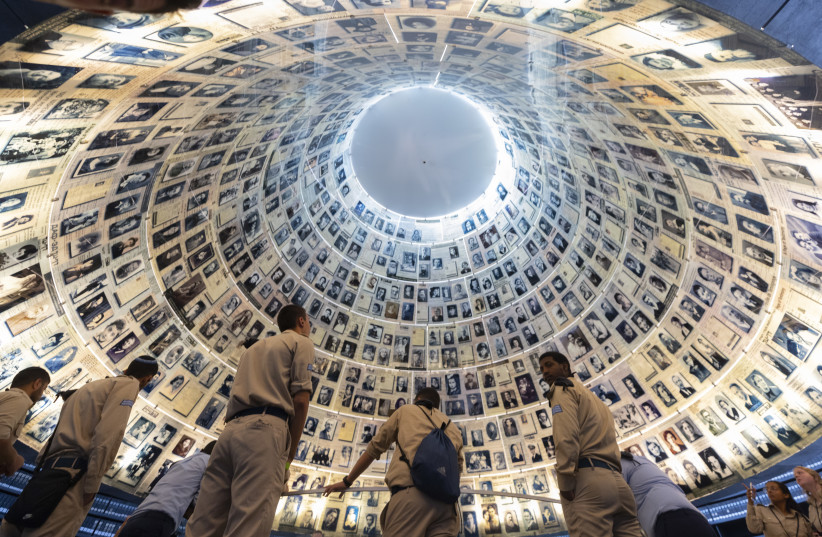We are approaching Israel’s “Solemn Days”: Holocaust Remembrance Day and Remembrance Day for the Fallen of Israel’s Wars and Victims of Terrorism, followed immediately by Israel’s Independence Day.
There has been much debate around how the celebrations for Independence Day should be adapted in light of the events of the last months since the Hamas attacks of October 7 and the war that has ensued, but we should first consider what if any affect these events may have on Holocaust Remembrance Day.
While the use of Shoah language has been common in the intervening months, we risk diluting the importance of the day if the rhetoric and images employed become overly influenced by the horrific and tragic events of the last half year.
In years gone by, the political rhetoric of Holocaust Remembrance Day has extended well beyond the specifics of the Holocaust.
Only last year, Israel’s prime minister opened the official proceedings for Holocaust Remembrance Day during a visit to Germany by referring to the threat of Iran and comparing them to Nazis, specifically warning of their genocidal threats against Israel. The prime minister is very much not alone, but he has made it almost a trademark of his speeches on the issue over the last number of years. Given the recent massive missile attack from Iran, it would not be a surprise if he chooses again to stress this theme.

Almost from the moment of the attacks in October, the Holocaust, Nazis and genocide have been widely and liberally used in news commentary, social media and political discourse.
These terms have been used by Israel’s close allies and supporters to describe the barbarism of the Hamas terrorists, and to point out that the 7th of October was the worst attack on Jews since the Holocaust and that Hamas’s charter and policy is genocidal towards Israelis and Jews in general.
For Israel’s opponents, haters and assorted useful idiots, it is a mirror image. Israel is compared to Nazi Germany repeatedly, Israel is accused by South Africa in the International Court of Justice of carrying out genocide, with many other countries and pro-Hamas activists cheering on – and of course, the hateful atmosphere on many university campuses has more than genocidal overtones.
Our opponents’ use of this imagery and language is revolting and driven by an ideology of hatred of Israel and in many cases antisemitism. But even if the comparison of Hamas to Nazis and highlighting their genocidal tendencies is seemingly reasonable and even absolutely warranted, carrying this over to Holocaust Memorial Day itself risks diluting the memory of the Holocaust rather than elevating it.
The "Never Again" purpose of this day
THE PURPOSE of Holocaust Remembrance Day is twofold. In the 1959 law that established the day in Israel’s official calendar, there is a single purpose mentioned – “The day is dedicated each year, to the memory of the Holocaust that the Nazis and their proxies carried out against the Jewish people and remembrance for the acts of heroism and rebellion in those days.”
There is a second purpose that has developed over the years, which can be best termed as “Never Again!” meaning that the memory of the Holocaust is not only to mark the horrific events in time, but to warn of the risk of them being repeated. In Israel this is variously interpreted as: Never be a passive victim, never forsake your brothers, never be passive bystander, and never be a perpetrator.
I think that it will be impossible and perhaps even inappropriate to ignore the current events and the sense of sadness in the air during this year’s events, but we need to balance this with unwarranted and overdone comparisons. The barbarism of Hamas is worthy of denigration without any reflection on the Nazis, but there is little merit in some type of comparative analysis of who is worse.
There may even be purposeful educational benefit for a generation that barely has second-hand knowledge of the Holocaust, never mind first-hand, with almost the entire generation of survivors no longer with us, to see what hate and antisemitism can lead to. And yet, as bad as Hamas is and the sadness of the loss and sacrifice is palpable in the air, it cannot be used as a full proxy for the murder of six million Jews and the horror of 12 years of Nazi rule culminating in the Final Solution.
As the siren rises, I will first be reflecting on the memory of the victims of the Holocaust and try without success to understand its enormity, and only then will I consider the victims of October 7. We are currently in a period when the events of last Simchat Torah are on our minds all day and every day, and hence we ought to give the Holocaust the day it sadly deserves.
The writer, a founding partner of Goldrock Capital, is the founder of The Institute for Jewish and Zionist Research. He is a former chair of Gesher, World Bnei Akiva, and the Coalition for Haredi Employment.
